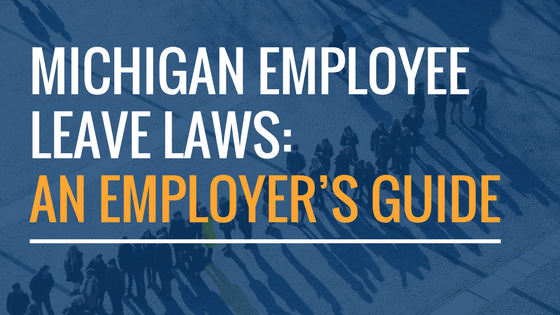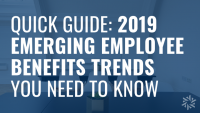
Employers may provide employees with different types of unpaid and/or paid leave as part of their total compensation package such as Paid Time Off (PTO), sick days, and flex time. Employers have some flexibility when it comes to establishing and negotiating these types of employee leave policies.
However, federal, state, and local laws require covered employers to provide employees with leave in certain situations. In addition to federal leave laws such as the Family and Medical Leave Act (FMLA) that we discussed in our recent seminar, Michigan has employee leave laws regarding:
- Jury Dute Leave;
- Crime Victim Leave
- Military Service Leave
- Maternity Leave; and
- Disability Leave.
The following table provides employers with an overview of Michigan’s employee leave laws and suggested compliance steps.
OVERVIEW OF MICHIGAN EMPLOYEE LEAVE LAWS
| TYPE OF LEAVE | REQUIREMENTS |
|---|---|
| Jury Duty Leave | Employers may not discharge or discipline an employee for taking time off from work to serve on a jury. Leave is generally unpaid; however, some municipalities may provide additional protection for employees called to jury duty. Employers should check local ordinances in the areas where they do business.
Employers generally may not require an employee to work additional hours in a day if, when added to jury duty hours, the total time would exceed the number of hours the employee normally works. |
| Crime Victim Leave | An employee who is a victim of a crime or a representative of a crime victim is entitled to take time off from work to testify in or attend a judicial proceeding. Leave is unpaid.
A victim representative is:
Employee protections apply. |
| Military Service Leave | In addition to USERRA, Michigan law provides employment protections for Michigan and U.S. military members.
Nondiscrimination protections and reemployment rights for military service members following military service leave. |
| Maternity Leave | Nondiscrimination requirements apply to all employers. Female employees who are affected by childbirth or related medical conditions must be treated the same for all employment-related purposes (including receipt of benefits under fringe benefit program) as other persons not affected by pregnancy, but similar in their ability or inability to work.
Employers are also prohibited from terminating a woman’s employment because of her pregnancy. |
| Disability Leave | Employers may not discriminate against an employee on the basis of an employee’s disability that is unrelated to the individual’s ability to perform the essential duties of a particular job or position.
A person with a disability is someone with a determinable physical or mental characteristic resulting from disease, injury, congenital condition of birth or functional disorder which substantially limits a major life activity. Employers must provide disabled employees reasonable accommodation for their disabilities. |
NOTE: The above information focuses on Michigan’s statewide leave laws. Employers should also be aware that many cities have enacted local laws mandating paid sick leave. If an employer is located in a city with a paid sick leave law, they must comply with both the local ordinance and statewide law, if applicable.
Compliance Steps
It is imperative that Michigan employers understand when their employees are entitled to take time off from work, and the legal protections associated with such leaves. Employers that violate state or federal leave law requirements may be subject to government investigations, fines, employee lawsuits and significant penalties, fees and damage awards.
To minimize these risks, employers should review applicable federal and state leave law requirements and determine whether they have any compliance gaps to correct. This compliance review may be complex, especially in areas where federal and state leave laws overlap.
As part of the compliance review, employers should confirm that:
- Employee handbooks and written policies and procedures have been updated to accurately describe employee leaves;
- Human Resources personnel, as well as managers and supervisors, are educated on how to administer employee leaves and receive ongoing training;
- Employee leaves are administered on a consistent basis, and employees are educated on leave rights and requirements;
- Recordkeeping systems accurately track and document employee leaves; and
- Required notices and posters regarding leave laws are provided.
For other questions regarding Michigan leave laws, you can contact your dedicated Austin Account Director or contact us directly at 248.594.5550 or service@austinbenefits.com.



